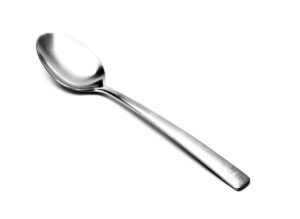 It’s been a long day, and I’m almost out of spoons. I have a couple to use writing this, but I’ll need a good sleep to forge more spoons for tomorrow.
It’s been a long day, and I’m almost out of spoons. I have a couple to use writing this, but I’ll need a good sleep to forge more spoons for tomorrow.
Does this sound odd to you? Let me tell you about “Spoon Theory,” my current preoccupation. Spoon Theory is a real thing—you can find it in Wikipedia, listed as a neologism (a phrase just entering popular usage). Spoon theory is the brainchild of the wonderful blogger Christine Miserandino, who has Lupus. She explained life as a Luperian (is that a word? A neologism?) by using spoons to represent the energy it takes to do things.
According to spoon theory, every task we ever do—getting up, taking a shower, driving the kids to school—costs a spoon. Most people, most of the time, have dozens of spoons. But there are times when some of us wake up with only ten, or four, or one.
If you’ve only got one spoon, you have some decisions to make. Should you shower, make breakfast, pay your bills, or focus on a crucial work project? Choose carefully. Your options are practically nil.
As someone who’s had various autoimmune diseases since my teens, I’m acutely aware of everyone’s spoon count. I raised my longsuffering children on a king-size bed, since I usually couldn’t walk, sit, or stand without pain.
So the other day, when someone with her own autoimmune issues offered to check my email for me, I said, “That’s not happening. You’re out of spoons.”
“No, you don’t understand,” she said. “That would give me spoons.”
Wait. What?
“If it were my email, it would take spoons,” she explained. “My email makes me want to join a witness protection program. But doing it for you makes me happy. See?”
And I saw! I did! Her cheeks were pink, her eyes suddenly, subtly, brighter. She had accrued a spoon! Just one, but still.
The implication of this event, while shocking, must be faced squarely:
SOME ACTIVITIES CAN GIVE YOU SPOONS!
This isn’t part of classic Spoon Theory, so far as I know. But as I cast my mind back to my own most spoonless times, I remembered occasional, inexplicable surges of energy. I’d hear a bit of wisdom, and feel my baseline vim spike up to near normalcy. Or I’d have a good cry and then feel lighter, stronger. In fact, most of my self-help advice comes from being absolutely out of spoons, and then noticing that certain thoughts and actions added to my inner silverware drawer, instead of robbing it.
Now, please don’t think I want you to buck up, ignore your depression or fibromyalgia, and clean your damn house. Dude, you might as well just fling all your spoons into a live volcano. No, no, no. I just want you to go wherever your spoons take you.
See, we don’t get to choose which effect a given activity has on us. I can’t make my email give me spoons—I’ve tried, and the effort left spoon-shaped gouges all over my soul. But sometimes when I’m low and miserable, I notice a topic, a book, or a person, and hear a tiny plink! inside. My ears perk up. My mind clears.
Spoon!
I believe we’re all being steered by our true selves, and our true selves’ favorite steering mechanism is spoons. When we stray off course with actions or even thoughts, nothing on earth can make us feel spoonful. When we take a single step in the right direction: Spoonage! Maybe a teeny espresso spoon appears, or maybe it’s a big old soup ladle. A spoon is a spoon. Just keep doing whatever created it.
If you long for the world to be a saner, more loving place, please be advised that you must start inside. Care for your sick, anxious, exhausted self as lovingly as you want to care for every suffering thing. And when you find something that gives you spoons, go toward it. Go right into it. Go wherever it takes you. If I’m brave enough to follow my own heart, I know I’ll have the spoons to meet you there.










17 comments
AT 5:00 PM
AT 5:29 PM
AT 4:01 PM
AT 9:00 PM
AT 1:53 PM
AT 4:57 AM
AT 3:33 AM
AT 11:03 AM
AT 12:39 AM
AT 7:08 PM
AT 12:57 PM
AT 2:22 PM
AT 2:59 PM
AT 7:35 AM
AT 11:40 AM
AT 3:21 PM
AT 1:22 PM